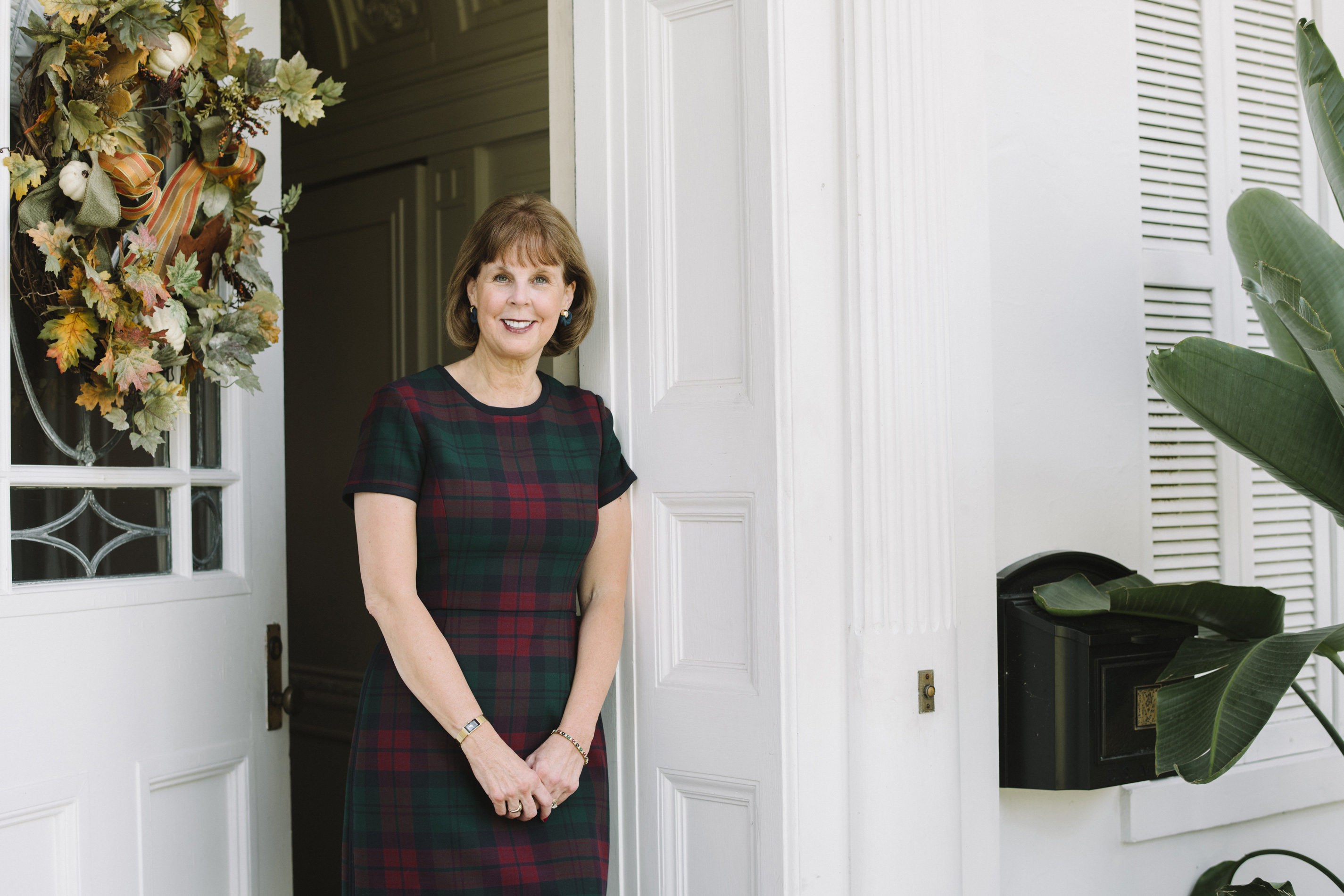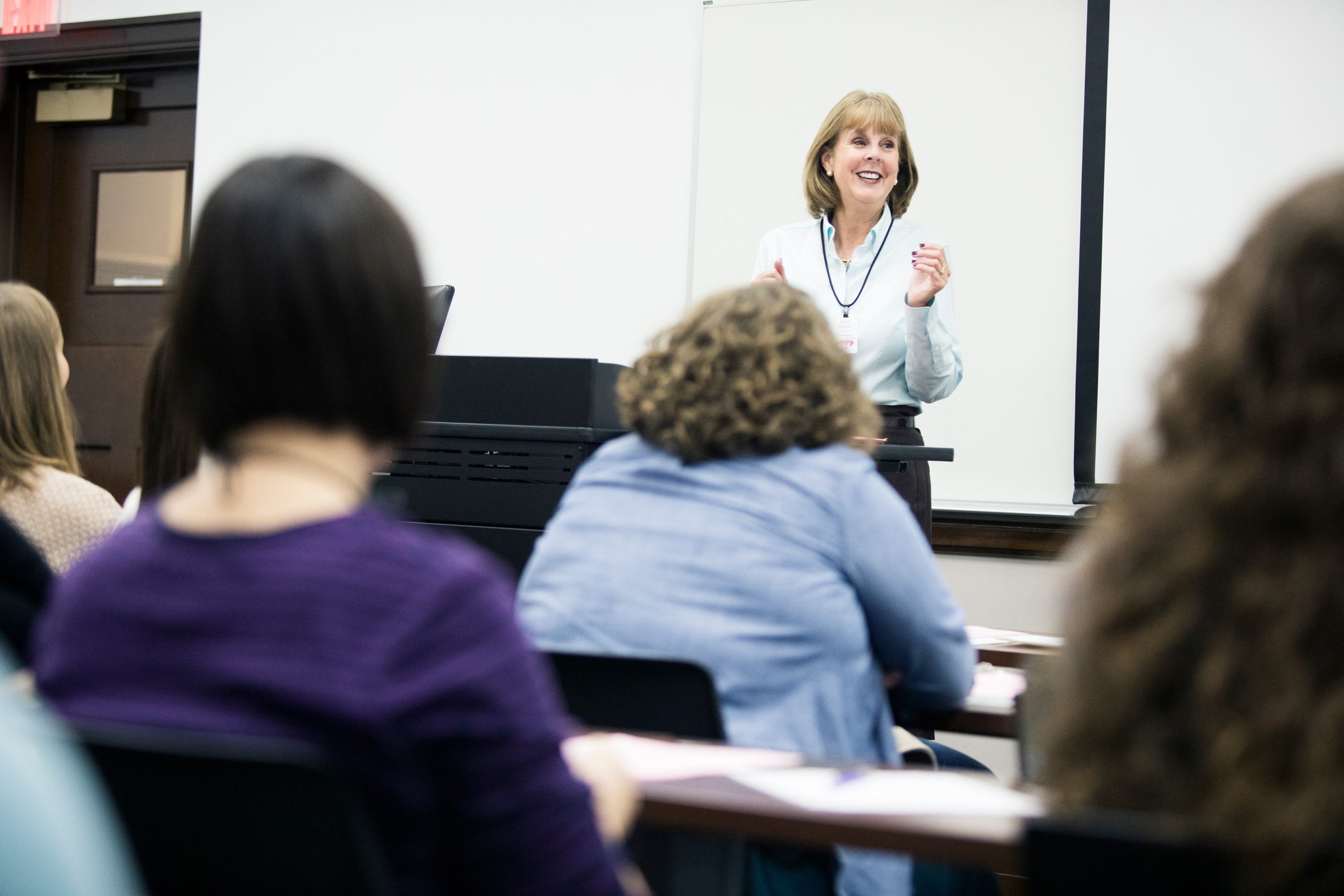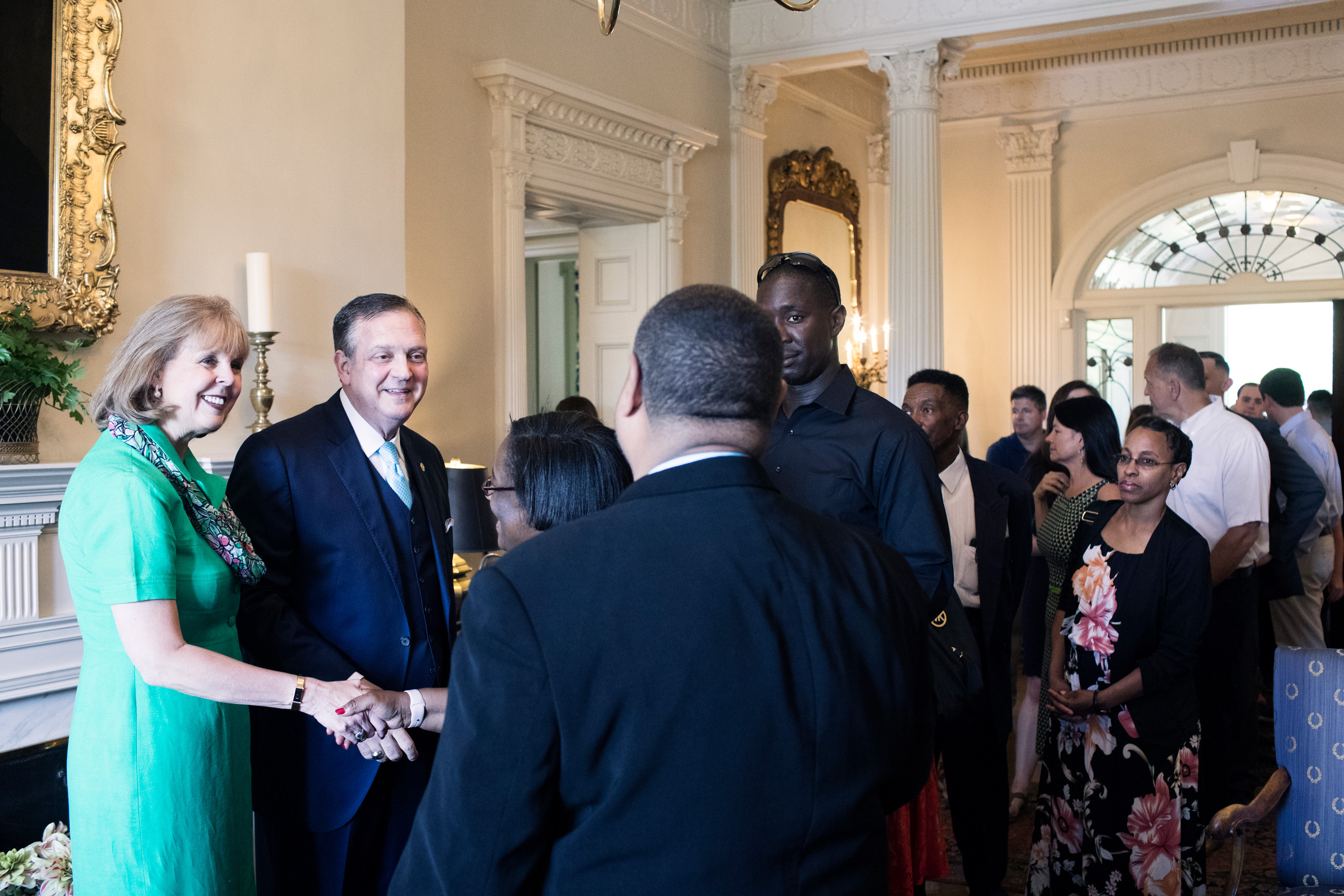In early 1992, Mary Mohler finally had her dream job: wife and mom. But her life was about to take an unexpected turn. Her husband, R. Albert Mohler Jr., had just been nominated to be the ninth president of The Southern Baptist Theological Seminary.
“I’ve finally got these two precious kids. We’re living on a cul-de-sac in a neighborhood in suburban Atlanta. Things are going along pretty well,” she said in an recent interview in her home, recalling her guardedness upon learning of his nomination.
“He’s only 33 years old. Does this happen?” she remembers asking herself. “I was also a little bit leery of what that would mean — living in a big glass house.”
The two married a decade earlier after a long-distance courtship that started at Samford University in Alabama. She was a pre-med freshman when they started dating; he, a senior. She stayed in Birmingham to finish her biology degree while he settled in Louisville to work toward a master of divinity degree at Southern.
“The summer of 1983 was epic,” she says. “I graduated one week, he graduated the next with his master’s, and we married six weeks later and set up our first home in Fuller Hall.”
She worked in local doctors’ offices for the next six years to help put him through the doctor of philosophy program at the seminary. But acclimating to Louisville was not easy. Her husband already knew people from his M.Div. years, but she was an outsider, and the other seminary wives she met did not share her ideas about what it looked like to be a pastor’s wife. In fact, within the seminary at that time, the prevailing attitude about gender roles was egalitarian: Most students believed men and women should hold the same roles in the home and in the church, including the offices of pastor and elder. This translated to what Mrs. Mohler calls a general disdain for the idea of being identified as a “wife.”

“There were women who were clearly not interested in being identified as anybody’s wife,” she recalls, explaining the mindset she repeatedly encountered. “‘Don’t call me a pastor’s wife,’ was the attitude. ‘I’m not going to let them get two for one. My separate role must be recognized and compensated too.’ That was all foreign to me.”
On top of feeling like an outsider, she and her husband shared an unmet longing for children.
“We were ready to start a family, and it just wasn’t happening,” Mrs. Mohler said. “It seemed everybody around us was having babies. I would host baby showers for people, and then everybody would go home, and we’d be surrounded with the stuffed animal decorations. It was just painful.”
But babies did come. Less than a month before Dr. Mohler graduated with his Ph.D. in 1989, Mrs. Mohler gave birth to their daughter, Katie. They then moved to Georgia for Dr. Mohler to take a job as editor of the Georgia Baptist state newspaper, the historic Christian Index, and, while there, welcomed their son, Christopher, in 1992.
I really had no idea just how challenging it would be and that turned out to be the Lord’s providence. It would have been overwhelming otherwise.
By 1992, Mrs. Mohler had the life she longed for, and they were about to pack up and relocate. For her husband to accept the presidency, the family would move back to Louisville, the city they’d left only four years earlier.
“At first it’s just talk, you know? Then he’s one of the final three, and then, when he was the presidential nominee, it all just became surreal,” she said. “I had no doubt that he was up for it — I realized early on what an unusually gifted and brilliant man he is — but we both knew this was going to be a challenge. To be honest, I really had no idea just how challenging it would be, and that turned out to be the Lord’s providence. It would have been overwhelming otherwise.”
Conflict at Southern Seminary
When Dr. Mohler was elected, Southern Seminary was at the center of a high-stakes, theological tug-of-war between generally conservative trustees and generally liberal faculty. The trustees saw Dr. Mohler as the man with the conviction necessary to return the school to its founders’ vision. The faculty and students, however, saw him as a threat to the seminary’s progressive course.
Much of the controversy centered around the school’s Abstract of Principles. Once the guidepost for hiring orthodox faculty, it had come to be seen as a relic of the past, not to be interpreted literally — something professors could sign with their fingers crossed. Dr. Mohler didn’t see it that way. To him, signing the Abstract was a non-negotiable confessional statement, a promise to the Southern Baptist Convention to whom the school answered. But this stance cost him the support of many at the school.
“His election was clearly not what the faculty wanted to happen, not what the students wanted,” Mrs. Mohler said. “It didn’t take long for things to start exploding.”
And when they exploded, she was there, in the President’s Home just across the street from campus, to provide support to her husband. She was there during professors’ public resignations, critical student demonstrations — which included the burning of effigies — and the faculty’s vote to censure Dr. Mohler. She was there to listen, to cry, to pray, and encourage — to create a stable family life in a situation that was far from the norm for most young couples.
“Some days he’d come in the door with a certain look on his face, and I would know something was up yet again,” she said. “So we’d have dinner, try to have some sense of normalcy with preschoolers, go to the playroom, give the kids baths, and put them to bed. And then I would debrief with him. I didn’t demand a play-by-play, but I wanted to ask good questions. I well remember wanting to make sure he knew he had my unconditional support. And I’d assure him that he had my specific prayers — at 2 o’clock, if there was a 2 o’clock meeting the next day. Remember, there was no texting or emailing then so I would either have to wait for a quick phone call or wait until he got home. That was hard.”
Their children, said Mrs. Mohler, were a bright spot for them during these trying years.
“We took seriously our responsibility to be godly parents. We did the best we could to prioritize the kids, realizing how short that season is. No regrets there whatsoever!”
Redemption and return to orthodoxy
The trustees were also a bright spot. When faculty members rebuked Dr. Mohler, the trustees adopted a statement in support of his actions. With their backing and through the providence of God, Dr. Mohler managed to steer the seminary back on course. The faculty who disagreed either resigned or took early retirement, and new faculty — world-class scholars who affirmed the Abstract — were brought on board.
“His dream had always been not just to return the institution to orthodoxy but also to fill the faculty with people who shared the same theological convictions, to make this place what it once was and could be again,” said Mrs. Mohler.
But she witnessed the redemption of more than just the conflict at the seminary. She saw also the redemption of her own struggles from their early years of marriage. The infertility they’d faced, the loneliness she’d felt without like-minded friends, the challenges of supporting a husband in ministry — she was able to funnel what she’d learned from these forms of suffering into a program that would help seminary wives prepare to minister alongside their husbands.

The Seminary Wives Institute, founded in 1997, grew out of Mrs. Mohler’s attendance with another faculty wife at a meeting with sister seminaries about women’s programs.
“We got home, and we were so excited,” she said. “We called together faculty wives because this could not be a one- or two-woman operation. By God’s grace, the new faculty my husband was assembling came here with amazingly gifted wives. I’ll never forget that I completely lost my voice — I had so much I wanted to say. We had 100 student wives register that fall, and the rest is history.”
Since that time, more than 3,000 seminary wives have taken at least one of SWI’s classes, which include both practical ministry courses taught by faculty wives and biblical studies courses taught by professors.
“It’s a team effort. The faculty wives who teach with me come from different backgrounds and have different areas of expertise, but together, we present a united mindset about the exciting calling to be a ministry wife,” she said. These classes provide not only teaching but also discipleship, community, and support.
Another way Mrs. Mohler ministers to the campus is through her work with The Southern Exchange, a donation-based resource on campus that enables students and their families to choose from clothing, furniture, books, and toys that others within the community have donated.
Southern’s past and future
In discussing her time with both SWI and The Southern Exchange, Mrs. Mohler is quick to credit the volunteers who work alongside her — and to point out God’s faithfulness. She also sees his hand in the changed atmosphere on campus.
“When we were here in student housing, there was Levering Gym with a pool in the basement and a really old cafeteria in Sampey Hall. Now we have the spacious Honeycutt Campus Center, which houses so many wonderful amenities. There is the Legacy Hotel — which was transformed from tiny student apartments. And what a difference Boyce College has made! It has infused the campus with so much youth and energy and excitement,” she said. “I would hope and pray that when you walk on this campus, it has a completely different feel to it. The Lord is at work.”
Twenty-five years has changed more than just the seminary. It’s also changed the Mohler family, who’ve had many milestones take place right on campus.
“From a personal standpoint, our story of 25 years is the story of our children, who were 1 and 4 when we arrived and are now 26 and 29. That’s sobering for me to think about,” she says. “It’s the only life they have ever known. Katie and Riley (Barnes’) wedding in Alumni Chapel in 2013 was a huge milestone. Riley is the answer to all of our prayers for a godly husband for Katie and is a wonderful addition to our family. Christopher walking across that same stage in 2015 as a graduate of Boyce College was another thrilling milestone. In the entire 159-year history of the seminary, there had never been a president’s child to graduate.”
She lights up when she talks about her kids and, now, grandkids.
“During this 25th anniversary, we’ll be welcoming not one but two grandsons to celebrate with us. We will be a blubbering mess, I promise you, having those little boys here to join in the fun as we make more memories. We give God all the glory for the privilege of being both parents and grandparents,” she said. “Anyone who knows us or has seen the myriad of social media posts knows that we are delighting in this joyful stage as Grammie and Papa. In fact, we likely border on being obnoxious.”

It is clear that giving God the glory is the theme of Mrs. Mohler’s life. In all her reflection on the past 25 years, she exhibits gratitude and humility.
“The Lord’s not looking for superstars,” she said. “He’s not looking for people who know all the answers. But he is looking for wives who are willing to stand beside their husbands and to follow wherever they lead and remember that they’re a team. We bring unique gifts to that team. Husbands are dependent on us as wives for support and encouragement in all circumstances. It’s impossible to overemphasize how vital that is.”
Her husband speaks glowingly of this support over the years — both that which she’s given him and that which she’s given the seminary.
“Every moment of my life is lived in constant thankfulness that this woman recklessly agreed to marry me,” Dr. Mohler said. “She is behind the scenes making so many things happen. Where any need is, there you find Mary. You find her in the Seminary Wives Institute, throwing her energy into The Southern Exchange, helping students in so many different ways. I’ve come home, and there’s been a wonderful meal, and I’ve found out she’s getting ready to pack it up and take it to the family of a student who’s had surgery. I just marvel at what she pulls off while being a mom and a daughter and a wife and a grandmother.”
To be a wife and mom was, of course, always Mary Mohler’s dream job, and that commitment to family translated into her support for thousands of other seminary families. As is often the case for wives and mothers, much of her work has been behind the scenes, but its effects are far-reaching, trickling down to future generations, demonstrating what a high calling women truly have.
She is, like her husband, a person of foresight and biblical convictions, full of hope for the future of Southern Seminary. “Our prayer is that those who come behind us — and we’re not leaving yet, we’re still here and eager to work, by God’s grace — that they will hold fast to the truth once for all delivered to the saints,” she said, balancing vigilance with gratitude. “As we reflect on the difficult early years we must also be quick to reflect on the many happy memories from the past 25 years. The Lord has blessed us beyond measure, and we give him all the glory.”
———
Kate Brannen Smith is a writer who lives in New Albany, Indiana.




